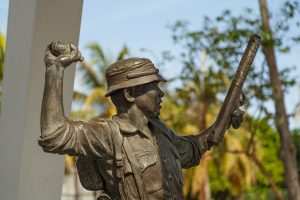On August 31, Malaysia celebrated its 64th Hari Merdeka (Independence Day), albeit in muted form due to ongoing COVID-19 restrictions. There was a small-scale parade at Putrajaya and some patriotic television programs were shown. In comparison, the celebration of Malaysia Day, which falls on September 16 and marks the formation of the Federation of Malaysia in 1963, is widely viewed by Malaysians as just another public holiday. But the formation of Malaysia was precarious and the young state fought a small undeclared war to preserve its sovereignty known as the Indonesia-Malaysia Confrontation or Konfrontasi.
The Konfrontasi was a small-scale military conflict involving Malaysia and Indonesia. The conflict started as soon as Malaysia, consisting of Malaya, Sabah, Sarawak, and Singapore, was formed on September 16, 1963. Indonesia under President Sukarno opposed the formation of Malaysia, which Sukarno saw as a British strategy, covertly supported by the United States, to contain Indonesia’s geopolitical ambitions in the region. The Philippines was also against the formation of Malaysia given its claims on parts of Sabah. The Philippines broke off diplomatic relations with Malaysia while Sukarno launched a “Ganyang Malaysia” or “crush Malaysia” campaign, utilizing both military and international propaganda operations.
The first major combat action of the Konfrontasi, known as the Battle of Long Jawai, commenced on September 28, 1963. A small force comprising 21 Malaysian border scouts, six British Gurkhas and two Royal Malaysian Police Field Force personnel was attacked by a larger force of 200 Indonesian soldiers at the Long Jawai outpost, about 48 kilometers from the Sarawak-Kalimantan border. The British-Malaysian force was defeated and the Indonesians executed 10 captured Malaysian border scouts.
Indonesian military forces continued to conduct numerous cross border raids in Sarawak and Sabah from Kalimantan, through the porous mountainous and jungle borders. This was slowly countered by Malaysian security forces, aided by a strong contingent of British Commonwealth military forces, mostly from the United Kingdom, Australia, and New Zealand.
The Malaysian and British Commonwealth forces used counterinsurgency tactics and operational concepts developed and used successfully in peninsular Malaysia during the Malayan Emergency, due to the similar topographical nature of Borneo and the small-scale raiding nature of the campaign. This entailed track-and-ambush tactics, “hearts and minds” operations to win over the tribes living in the Borneo rainforests, and tireless intelligence gathering missions.
Some of these operations were kept secret until recently. One such secret operation was codenamed “Claret,” and involved dangerous cross border intelligence-gathering missions and later, track-and-ambush operations inside the Kalimantan region of Indonesia. The British 22nd Special Air Service Regiment (SAS), in addition to an Australian SAS squadron and a troop from New Zealand SAS, were known to have conducted numerous successful clandestine crossborder special operations in support of “Claret.” These successful special operations are still studied at some military staff colleges around the world today.
Meanwhile, Indonesia attempted to open a second front by launching commando raids in Peninsular Malaysia from mid-1964. Indonesian commandos launched amphibious raids on the coastal areas of Johor and Singapore on August 17 of that year, and later, para-commandos were also parachuted into the peninsular on September 2 to conduct subversion and sabotage attacks. All of these Indonesian commando operations were disrupted and destroyed by Malaysian and British Commonwealth security forces.
Malaysia also conducted a whirlwind of diplomatic visits between 1964 and 1965 to gather support for the newly-formed Malaysian Federation. This diplomatic effort was led by the then Deputy Prime Minister Tun Abdul Razak and Singapore’s Chief Minister Lee Kwan Yew. This diplomatic effort and experience contributed to the foundation of contemporary Malaysia’s grand strategy of utilizing diplomacy to resolve international issues peacefully.
Meanwhile, Sukarno was replaced by Suharto at the end of 1965 after a failed coup and the subsequent elimination of the Indonesian Communist Party. The Konfrontasi lasted until 1966, when Indonesia under Suharto decided to explore options for ending the conflict. Both Indonesia and Malaysia held peace talks leading to the final conclusion of the Konfrontasi with the signing of a peace treaty in Bangkok on May 28, 1966. During the Konfrontasi, 114 Malaysian and British Commonwealth security forces were killed.
The end of the Konfrontasi led to the formation of the Association of South East Asian Nations (ASEAN) in 1967. ASEAN was to prove useful in reconciling relations among three of its five pioneer members, namely Malaysia, Indonesia, and the Philippines. ASEAN has since expanded to include all of the Southeast Asian states barring Timor-Leste, and has performed well in managing regional economic and security issues. Indonesia, the Philippines and Malaysia have rebuilt their relationships and are close partners today in sustaining ASEAN’s collaborative spirit.
In June 2017, Malaysia, Indonesia, and the Philippines launched the Trilateral Maritime Patrol (TMP), which enabled them to conduct joint sea and air patrols in the Sulu Sea area to counter kidnappings and sea robberies. The trilateral patrols also involve information sharing, coordinated communications, and the right of hot pursuit into each other’s maritime zones. This came after the three states initiated the Malacca Straits Sea Patrol in 2004, with the aim of securing the Straits of Malacca. This later expanded its scope of operations and turned into the Malacca Straits Patrol (MSP), with Thailand officially joining in 2008.
Sir Basil Henry Liddell Hart (1895-1970), the famed military strategist who wrote the famous book “Strategy” (first edition in 1941; second revised edition in 1954), posited that, “The object of war is a better state of peace.” From this perspective, the Konfrontasi was not fought in vain. It served as the catalyst for the peaceful, prosperous, and cohesive Southeast Asia that is so easy to take for granted today.

































